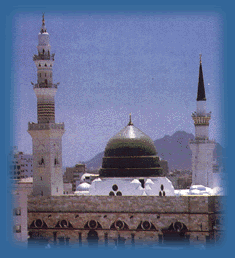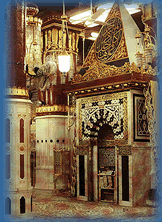
The
mosque of the prophet, Madinah
Call
to mind the time when the disbelievers plotted against you that they
might confine you, or kill you or expel you.
They planned and Allah also planned,
and Allah is the best of planners.
Qu’ran 8: 31
In the early days of Islam Muhammad was confronted by considerable opposition, including from those whose prosperity and influence were tied to the Kaaba, a well-known sanctuary and place of pilgrimage.
By 622 CE, relations between the growing group of Muslims and the more conservative forces in Makkah had reached a crisis, and Muhammad and his followers were compelled to leave the city (hijra is Arabic for “breaking off of relations”). They travelled to the oasis town of Yathrib, which would later become known as Al-Madinah an-Nabi (‘City of the Prophet’), now simply Madinah (Medina).
As in the Christian world, where the birth of Christ was established by the sixth-century scholar Dionysius Exiguus as the beginning of an epoch, an Islamic calendar was introduced by the second Muslim caliph Umar c 638 CE. Considering the various dating systems used at the time, Umar and his advisors agreed that the most appropriate reference point for the Islamic calendar would be the emigration to Madinah (al-hijra), since it was such an important turning point for the fledgling Muslim community, allowing them as it did to mature and strengthen, and to develop a society based on Islamic principles.
The Islamic calendar has twelve lunar months, and years are counted since the hijra. Although Muslims do not traditionally celebrate a ‘new year’, the festival of Al-Hijra could be considered as such.

Mihrab
in the mosque
of the prophet, Madinah
In each mosque there is a mihrab (niche) which indicates the direction (qibla) in which to face when praying. In reality, the qibla points towards Makkah, at the same time as it symbolises orientation towards all that is holy. For those of us who are not Muslims, perhaps we can look at it as a focus on that which we perceive as holy, and that which can open up and enrich our lives.
In a similar vein, perhaps it would be useful to see the festival of Al-Hijra as a time to remember the price of bringing a new idea into the world, and the opposition this inevitably causes. And that in a time like this we, like Muhammad and the early Muslims before us, need to summon all the courage and endurance we can find, in order to ensure that the precious new vision might survive.
Nora
Leonard, February 2004